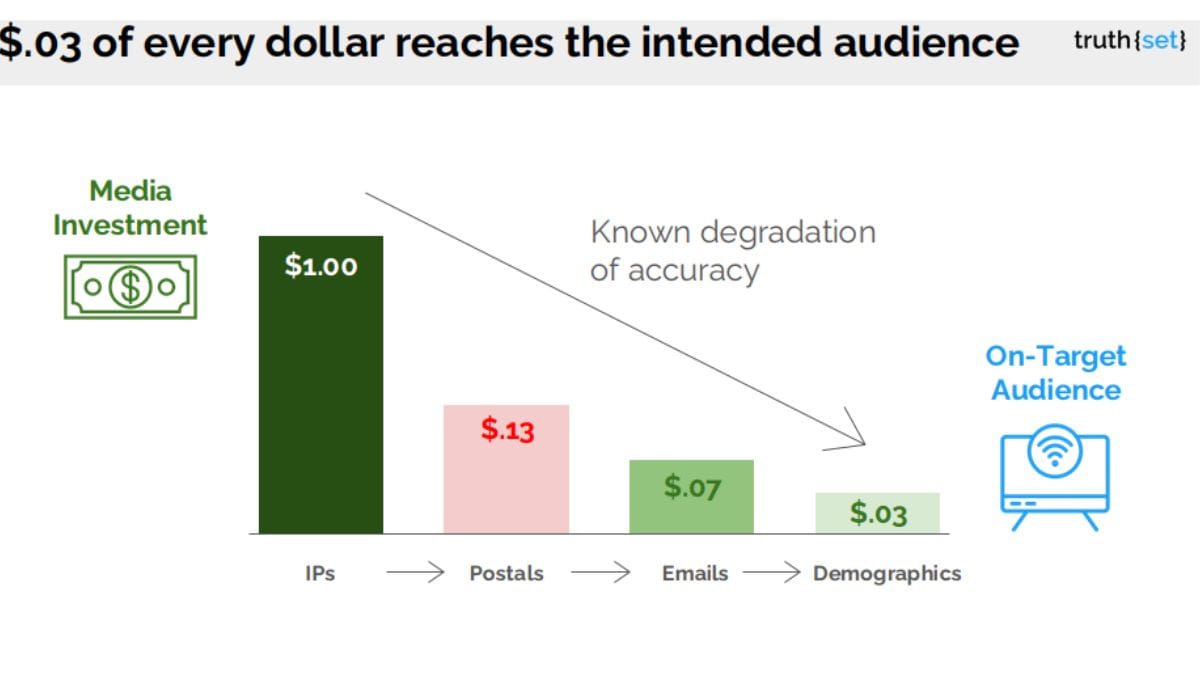Study Calls IP Address-Based Targeting Unreliable for CTV Ad Campaigns
Truthset finds IP addresses accurately linked to postal addresses just 13% of the time

A new study found that using Internet protocol (IP) addresses as the basis for targeting and measuring connected TV advertising campaigns isn’t very reliable.
The study, conducted by Truthset for the Coalition for Innovative Media Measurement (CIMM) and the TV industry’s Go Addressable coalition, found that IP addresses line up accurately with consumers’ postal addresses just 13% of the time and they line up with email addresses only 16% of the time.
As a result, for every dollar spent on campaigns using IP-based targeting, just three cents worth reaches the intended audience.
Truthset CEO Scott McKinley told The Measure he hoped the study would serve as a wakeup call for the industry.
“This is a major problem that’s undermining advertising effectiveness in open programmatic and the open web,” McKinley said. “The longer we stay here and don’t work on fixing it, the faster the big tech media giants are going to eat away at the remaining 20 cents on the media dollar they don’t already get.”

Those digital giants–Alphabet, Amazon, Meta–and subscription services like Disney+ are able to authenticate viewers using the email addresses they use to sign in.
Getting users to sign in would help free ad-supported streaming TV channels authenticate and better monetize their growing viewership, McKinely said.
The report is being released Wednesday at the Go Addressable Summit. Go Addressable was formed to standardize and promote addressable advertising. Its members include AMC Networks, Comcast Advertising, DirecTV Advertising, Dish Media, and Charter Communications’ Spectrum Reach.
The study also found that data providers agree only 6.4% of the time on IP-to-postal linkages and 2.8% of the time on IP-to-email linkages. It said there are three-times more IP addresses per postal address than there should be, and that IP timestamp recording is inconsistent across providers, with conflicting definitions of “first seen,” “last seen” or “versioned” undermining comparability.
Legacy systems also seem to have difficulty creating accurate linkages with the newer IPv6 addresses.
And when campaign effectiveness is measure, it often uses the same flawed household identifiers, so the results don't reflect reaching the right audiences.
"Accurate identity resolution is critical for the future of addressable TV advertising and cross-platform measurement,” said Tim Myers, executive director at Go Addressable. “However, this study shows IP addresses cannot accurately be used to identify and serve ads to the consumer or household as the primary method to target and measure. This sets the stage for industry-wide improvements and reinforces why advertisers and agencies should be using more deterministic identifiers.”
The study was conducted comparing nearly one billion IP records from six participating data providers against an accurate datable of IP address to household assignments provided by two top internet service providers and one leading multichannel video programming distributor.
IP addresses are assigned by internet service providers, which use the addresses to send content to devices in subscribers homes.
Data companies collected those IP addresses and used other data to identify the demographic characteristics of the people in those households consuming that content. The IP addresses became popular as identifiers because they are scalable and biddable in programmatic transactions.
The problem with using IP addresses is that they are frequently reassigned. That means that after a certain amount of time, the IP address in a database has been assigned to a different home–one with different demographics and geographies.
“Your IP address last week could be potentially different from yours last month, especially if you reset your router or there was a blackout. There are predictable and unpredictable reasons why your IP might change,” said Kathryn Barnitt, head of data science at Truthset.
The IP address linkage rates were higher for some providers than others and most of those providers want to use the study results to figure out ways to improve their accuracy.
“We're not here to blame any of the data sources that we're evaluating, it's a really hard problem,” Barnitt said.
Truthset has been working with many of the providers, who are part of Truthset’s data collective.
”I could tell their initial reaction was a bit surprised, but ultimately they leaned in and wanted our help diagnose what we think some of the problems were,” Barnitt said. “The ones who were good at their jobs are the ones who were like, show me what you saw. “
“IP addresses remain a foundational identifier for CTV, programmatic, and addressable advertising,” said Jon Watts, managing director at CIMM.
“Inaccuracies in IP-to-household data can erode advertiser confidence in its reliability for audience targeting, attribution and measurement. Greater transparency and stronger standards are the essential next step to unlocking scalable, accurate addressable advertising,” Watts said. “We hope strongly that this study is a positive next step in developing more robust quality controls and checks across the market and looking forward to working with stakeholders to deliver real improvements. This is a fixable problem.”
McKinley said he never wants to expose a huge existential fundamental problem without having some kind of remedy. The worst case scenario would be for the industry to bury its head in the sand and not address the problems, he said. He thinks the industry can coordinate to come up with ways to generate better IP address linkages.
The problem now with using IP-based targeting is that if you want to reach 10 specific consumers, you need to buy 10,000 ads. With the digital walled gardens, you buy 10 ads to reach those 10 consumers, McKiney said.
“You know who doesn't have any of these problems? Meta, Google, Facebook,” he said. “They don't have the problem because they just bother to ask me for my email address, fully compliant, telling me what they do with it in return for access to content. They don't have supply chain optimization problems.”
McKinley said some FAST publishers say they are reluctant to authenticate their viewers because they’re afraid of losing some of those viewers.
“And I'm like, Are you crazy? If you put a reg wall up, you lose 15% of your audience, fine. But now you can monetize the remaining 85% 10 times more effectively, and you might have a shot at surviving.”

